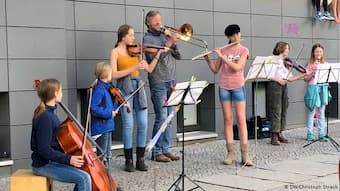The title page of the first edition of Bach’s Goldberg Variations describes the work as music “for the refreshment of their spirits”. During this time of pandemic, people have turned to music not just to refresh but also to provide distraction, comfort and a sense of connection.
Bach: Goldberg Variations, BWV 988 – Aria (Lars Vogt, piano)

An Italian singing from balcony
Largely confined to our homes and immediate vicinity, we are missing the social support of family and friends, and the freedom to enjoy our everyday lives as normal. People often turn to music in times of difficulty, often choosing music which is familiar and nostalgic which creates a sense of stability in uncertain times. Listening to music we know well reminds us of the life experiences that have shaped us.
In a time of enforced solitude and increased anxiety, familiar music offers comfort and reassurance, reminding us of who we are as people. It might be a favourite pop song from our teenage years or a memorable orchestral work we enjoyed at a concert, music creates an emotional narrative at a time when we may find it difficult to articulate the current narrative. It can help us build resilience, enables us to preserve an important sense of our identity, and acts as an aide memoire of previous events – a concert perhaps – enjoyed in less stressful, pre-pandemic times. It also allows us to participate in something larger than ourselves, even while we live apart, and as such can feel positive and life-affirming. This is nothing new of course: throughout history, people have turned to music to provide comfort and a place of retreat or escapism.

Musicians performing on street in Germany
Classical music in particular has long been regarded as “relaxing”: Haydn wanted his music to “give rest to the careworn” and the internet is full of playlists designed to help us “chill out”, calm, soothing and (usually) slow music has been proven to alleviate stress, lower heart rate and blood pressure, and ease depression. Tense music is not a good companion during tense times, and it was a deliberate piece of programming on the part of BBC Radio Three to re-broadcast Max Richter’s intentionally soporific ‘Sleep’ – an 8-hour post-minimalist lullaby – a few weeks into the UK’s lockdown.
In addition to listening, people are also making music, and despite the concert and opera venues being closed, there is a remarkable amount of music available online – from high-quality livestreams to ad hoc concerts from musicians’ homes, and much more besides. Music connects people – from audiences at a concert engaged in the collective act of listening to musicians playing in ensemble – and the loss of these important connections due to lockdowns and restrictions on gatherings has meant that people are finding creative ways to interact through music. From singing on balconies or giving impromptu performances from their gardens for neighbours to more sophisticated multi-performer concerts via Zoom, people continue to find ways to make and engage with music as a means to refresh, inspire, comfort and support.



